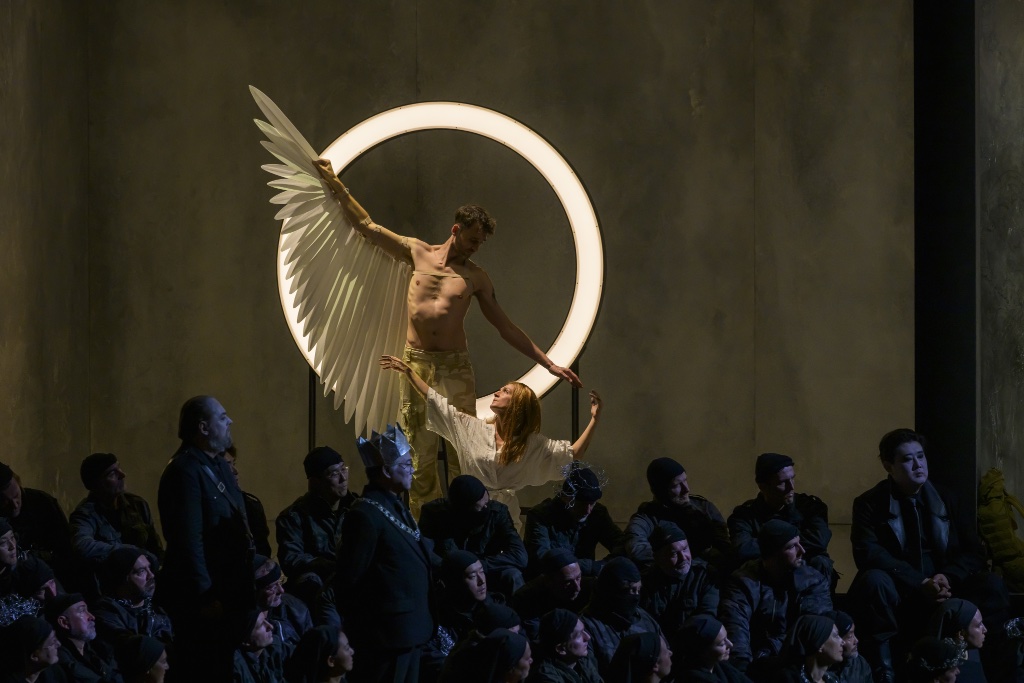The first night of Russian director Kirill Serebrennikov’s Paris Opera début at the Bastille was destined to be a sensational event. Serebrennikov, who has always been outspoken in his home country over such issues as LGBTQ rights (he is openly gay), gained worldwide renown by falling foul of the Russian authorities and being placed under house arrest for several years, only finally being allowed to travel abroad in 2022. Given the current situation in Russia and Ukraine, it is particularly touching, therefore, that this production of Richard Wagner’s Lohengrin (written in 1850, when the composer was in his 30s) should be suffused with imagery of war and its traumatic effects. Certainly, Serebrennikov’s different skills as stage and film director are put to good use here, with grainy filmed images of soldiers recurring throughout the opera.
The story, taken from various medieval tales, starts with Elsa of Brabant being charged by Count Telmarund with having murdered her younger brother Gottfried, heir to Brabant’s Christian dynasty. In reality, Telmarund’s wife, the sorceress Ortrud, has enchanted Gottfried. In this staging, from the very beginning of the orchestral prelude, we adopt Elsa’s viewpoint in a filmed clip as she lovingly follows her brother through a forest.
Gottfried, who is dressed in military uniform – a young Russian conscript? – strips naked and leaps into a lake, soon to be lost to her view. The next time we see poignant images of naked men on stage is much later in the opera, when dead young soldiers emerge from body bags as specters departing the world. During Elsa’s trial, a mysterious knight, who cannot reveal his name, appears in a boat drawn by a swan (here portrayed by two male dancers) to prove Elsa’s innocence. This turns out to be the Knight of the Grail Lohengrin, son of Parsifal (who himself would be the subject of Wagner’s final opera).
It must be said that, for all the emotional power of much of this production, anybody new to the opera might have little idea of the original story. Even the official program contains a synopsis that has been rewritten to fit Serebrennikov’s view of the opera, with the events forming part of the severely traumatized Elsa’s dream world as she is confined to a psychiatric hospital run by Telmarund and Ortrud. Given the number of operas I have seen set in psychiatric institutions over the past few years, it may be time to announce to future stage directors a moratorium on all such depictions! But the creativity and vividness of Serebrennikov’s imagination somehow make the overall experience of this production movingly convincing.
Musically, this Lohengrin is first-rate. If Polish tenor Piotr Beczala in the title role lacks the charisma and purity of tone of Jonas Kaufmann, who sang in the previous production of the same work in Paris in 2017, he delivers with clarity and honesty. The other roles, such as Elsa, performed on the first night by South African soprano Johanni von Oostrum (Sinead Campbell Wallace will take over later in the run), and Ortrud (luxury casting here with Nina Stimme on scintillating form, to be replaced in the second half of October by Ekatarina Gubanova) are every bit as good as the previous singers who played the parts. Von Oostrum has a beautiful but not huge voice, ideally suited to Elsa. I hope, however, that she will not be encouraged to sing the heftier Wagnerian soprano roles (such as Brünnhilde or even Sieglinde) until later in her career. Late Wagner operas have destroyed many a young voice by pushing singers into roles for which they are not yet ready.
Wolfgang Koch reprises with aplomb the part of Telmarund, which he sang in the earlier Paris production. Particular mention should be made of the British conductor Alexander Soddy, back in Paris after his triumphant stewardship of last year’s production of Benjamin Britten’s Peter Grimes. He elicits wonderful playing from the Paris Opera Orchestra.
Wagner makes great demands on his chorus in Lohengrin, probably more than in any of his other works, and it was especially good to hear the Paris Opera Chorus sing so magnificently throughout.
Nick Hammond’s latest book, The Powers of Sound and Song in Early Modern Paris, is available in paperback and as an e-book here and from online vendors.
Favorite
